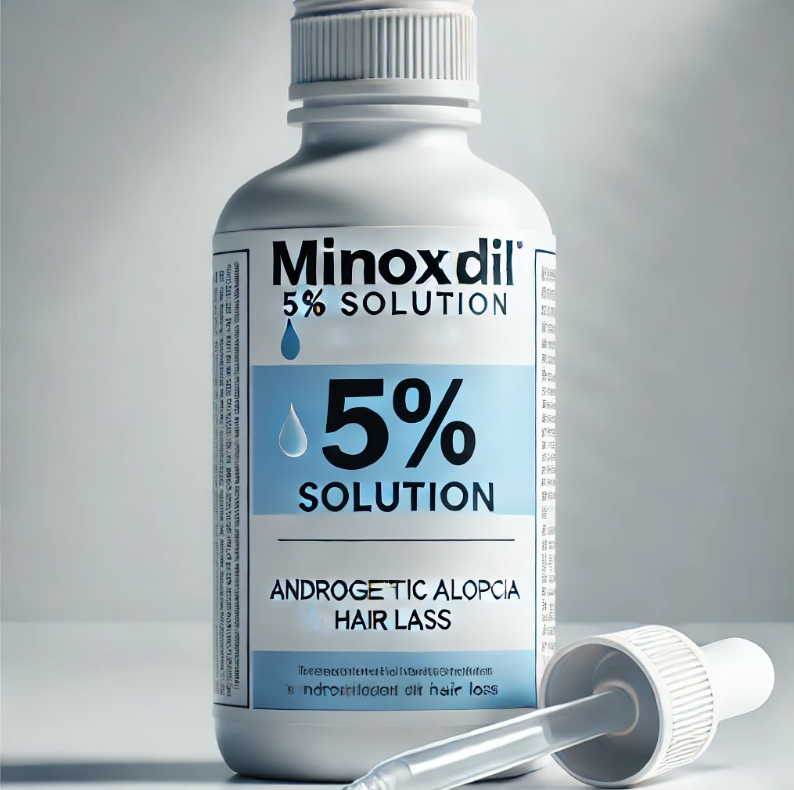Categories
- Blog (65)
Minoxidil is generally considered a safe and effective treatment for hair loss, but like any medication, it can have potential side effects. Understanding these side effects and safety concerns is important for anyone using minoxidil for hair regrowth, whether on the scalp, beard, or other areas.
Symptoms: Itching, redness, dryness, or flaking of the scalp.
Cause: More common with liquid minoxidil, which contains propylene glycol. This ingredient helps with absorption but can cause irritation in some users. The foam version usually causes less irritation as it doesn’t contain propylene glycol.
Management: If irritation occurs, switching to foam or using a moisturizing shampoo may help alleviate these symptoms.
Symptoms: Temporary increase in hair shedding when first starting minoxidil.
Cause: As minoxidil stimulates the hair follicles to enter the anagen (growth) phase, older hairs in the telogen (resting) phase may be shed.
Duration: This shedding usually lasts a few weeks and is a sign that the medication is working. After this phase, new, stronger hair growth begins.
Management: Consistent use of the product is important during this phase to ensure the shedding is followed by regrowth.
Symptoms: Unwanted hair growth in areas other than the scalp, such as the face, forehead, or neck.
Cause: Minoxidil can sometimes spread to nearby areas during application, especially if it drips or is applied too broadly. It is more common with liquid minoxidil due to the risk of dripping.
Management: To avoid this, be cautious when applying minoxidil, and wash your hands thoroughly after use. Wipe off any excess product that may have run down the face or neck.
Symptoms: Hair may appear greasy or oily after application.
Cause: More common with liquid minoxidil, which can leave a residue on the scalp.
Management: Switching to foam or adjusting the amount used can reduce this effect.
Symptoms: Red, inflamed, or swollen scalp.
Cause: This could be an allergic reaction to ingredients in the product, such as propylene glycol or alcohol in liquid minoxidil.
Management: Discontinuing use and consulting a dermatologist can help determine whether the symptoms are due to an allergic reaction.
Symptoms: Feeling faint, dizzy, or lightheaded, especially when standing up quickly.
Cause: Minoxidil is originally a vasodilator (used to treat high blood pressure), and while rare, some individuals may experience low blood pressure or dizziness as a systemic side effect if minoxidil is absorbed into the bloodstream.
Management: If dizziness occurs, stop using the product and consult a doctor.
Symptoms: Pain in the chest or an irregular heartbeat.
Cause: While rare, some users may experience cardiovascular symptoms if the drug is absorbed into the bloodstream in significant amounts. Minoxidil can affect heart rate and blood pressure due to its vasodilating properties.
Management: Seek immediate medical attention if these symptoms occur, and discontinue use.
Symptoms: Swelling of the hands, feet, or ankles.
Cause: Minoxidil may cause fluid retention, leading to swelling in certain areas.
Management: Discontinue use and consult a healthcare professional if swelling persists.
Symptoms: Shortness of breath or difficulty breathing.
Cause: Extremely rare but can occur if minoxidil enters the bloodstream in significant amounts and affects cardiovascular or respiratory systems.
Management: Seek emergency medical care immediately if difficulty breathing occurs.
Some people may have an allergic reaction to minoxidil or one of the inactive ingredients in the product. Symptoms of an allergic reaction can include:
Severe scalp irritation or rash
Hives
Swelling of the face, lips, or tongue
Difficulty breathing
If any of these symptoms occur, stop using the product and seek medical attention immediately.

Minoxidil must be used continuously to maintain its effects. If treatment is stopped, any new hair growth achieved with minoxidil will likely be lost, and hair loss will return to its previous state. This is because minoxidil does not cure hair loss; it stimulates hair growth while in use.
Although rare, there is a possibility that minoxidil can be absorbed into the bloodstream, especially if applied in excessive amounts or if there are cuts or abrasions on the scalp. This can lead to systemic side effects such as low blood pressure or irregular heartbeat. It is crucial to follow the recommended dosage (typically 1 mL twice a day) and avoid applying more than directed.
Do not apply minoxidil to a damaged or irritated scalp, as this can increase the risk of side effects by allowing more of the medication to enter the bloodstream.
If you have a history of heart disease, high blood pressure, or other cardiovascular conditions, consult your healthcare provider before starting minoxidil treatment. The systemic absorption of minoxidil, though rare, could exacerbate these conditions.
Women who are pregnant or breastfeeding should avoid using minoxidil unless specifically advised by their doctor. There is limited research on the safety of minoxidil during pregnancy, and the drug may pass into breast milk.
Common side effects include scalp irritation, initial shedding, and, in some cases, unwanted hair growth.
Serious side effects like dizziness, chest pain, or swelling are rare but require immediate medical attention if they occur.
Long-term safety concerns are minimal if the product is used as directed, but continuous use is required to maintain hair growth.
It’s important to follow the recommended dosage and avoid applying minoxidil to irritated or broken skin to minimize the risk of side effects.
Most people tolerate minoxidil well, and the side effects are typically mild and manageable. If you do experience significant discomfort or any serious symptoms, consult with a healthcare provider to assess whether minoxidil is the right treatment for you.